This design falls into the category of fashion as necessity: When temperatures push 90 and 100 degrees, there’s little else you want to wear besides a T-shirt. But even a tee can seem stifling when you add humidity to the mix. Here’s a T-shirt hack that’s meant to keep the air circulating–it features a cut-out back and a looser fit. (Of course, a trip to the local ice cream haunt doesn’t hurt the cooling plan either!)
I encourage you to dig into your fabric stash to find an unlikely contender for the fabric insert on this one. The fabric I used was originally purchased by my brother from a discount bin to use as a bed skirt. I inherited it when he moved, and my mom and I made curtains to filter the light in my apartment. Now the remnants have been reincarnated as part of this heat-beating T-shirt. What a life cycle! Tip: Check the give of your fabric–you shouldn’t have to worry too much about working on the bias (the diagonal of the fabric) since the rest of the T-shirt will have plenty of stretch, but consider your layout before you cut!
Materials:
-regular fit T-shirt
-fabric scissors
–disappearing ink pen
-ruler
-straight pins (optional)
–Aleene’s OK Wash-It fabric adhesive (or a sewing machine and thread to match your fabric)
Make it:
1. Turn the T-shirt inside out and lay it face down. Measure and mark about 3 1/2″ to 4″ in from either edge along the hem. Then draw a straight line from each mark to its adjacent sleeve (at the armpit).
2. Cut along that line through only the back layer. Continue cutting around the sleeve, just inside the seam (again, through only the back layer), along the top shoulder seam, and along the back of the neckband. Continue cutting until the back panel of the shirt can be removed. Set the front of the shirt aside momentarily.
3. Lining up the bottom edges of the fabric pieces, lay the back panel of the T-shirt over the backing fabric and trace the panel, extending the shape on either side to accommodate for the 3 1/2″ to 4″ wedge that was cut away. (The extra fabric will help create the flare.) Cut out the shape from the backing fabric.
4. Lay the fabric against the front piece of the T-shirt so that the edges of the two pieces line up, right sides together. Use the permanent fabric adhesive to glue the inside edges together. Optional: Use straight pins to hold the fabric edges in place before you glue.)
5. Ease the edges together, pinching and pressing them in place. Then let dry completely.
6. Turn the tee right side out and touch up any gaps along the seams.
7. Layer the tee over a thin tank top if you’re feeling demure, or be bold by wearing a colorful, barely there undergarment (the point is to limit the layers of fabric on the skin after all!).
Variations:
-Replace a panel along the top of the sleeve as well.
-Replace a smaller panel in the back of the T-shirt with a cotton crocheted doily.
-Make the flare more exaggerated and fluttery.
-Experiment with different fabrics (silk scarf, old mesh sports jersey, a linen table cloth).
Next up? Though I quite like the subtle contrast in whites (the stark cream with the more ivory gauze), I’m going to experiment with dye the next time I make this design!
Tags: iLoveToCreate, mixing fabrics, no-sew, T-shirt hack, T-shirt refashion, T-shirt surgery
[ Posted on July 24th, 2012 ]

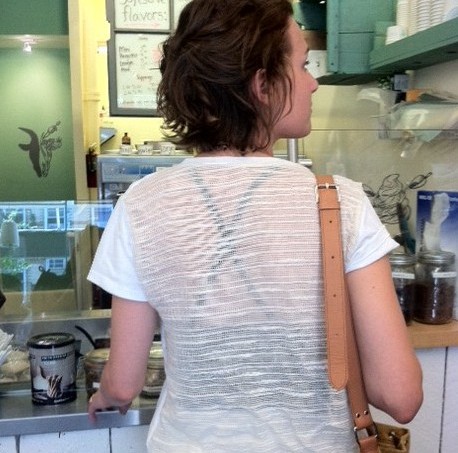
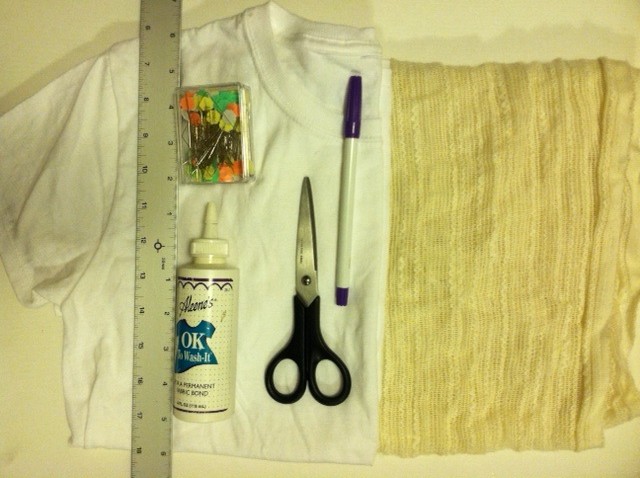
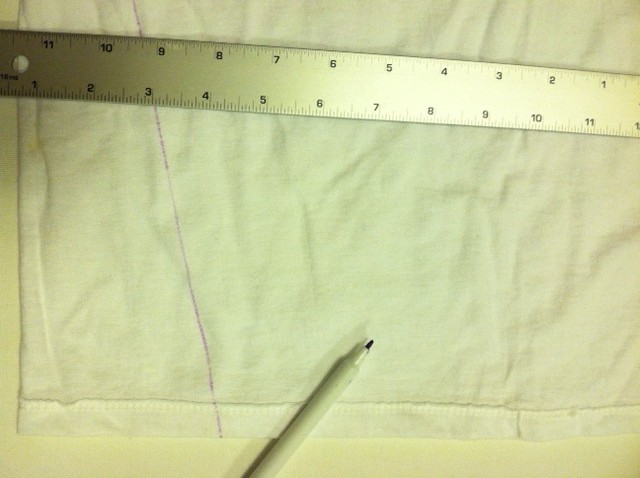
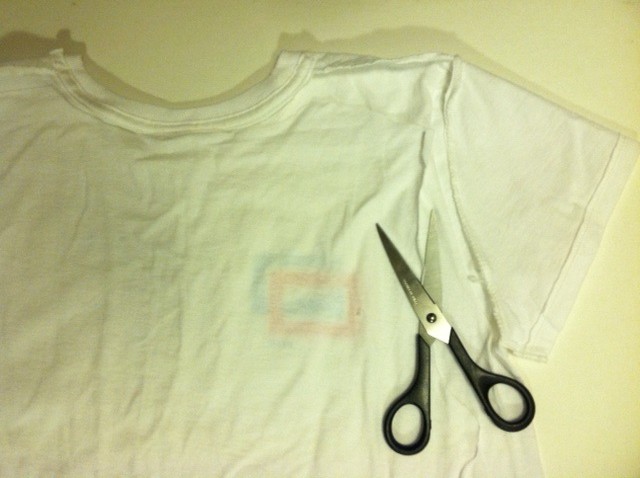
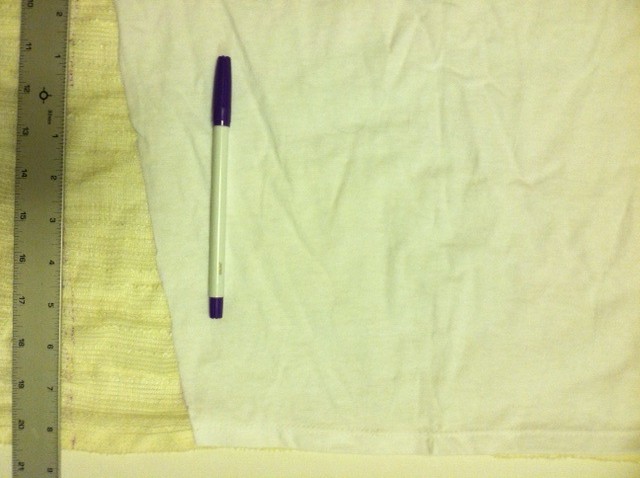
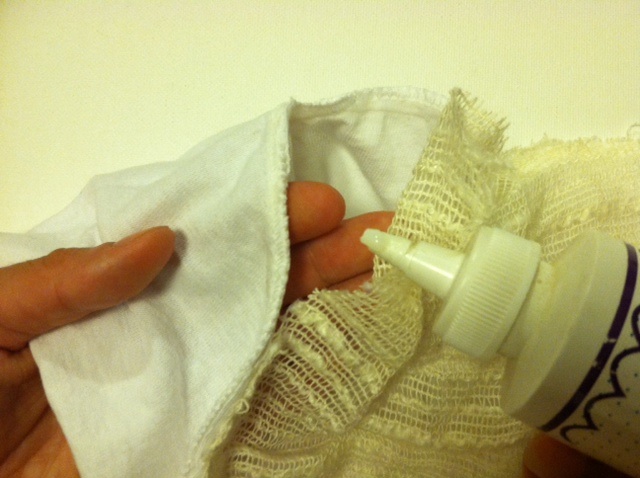
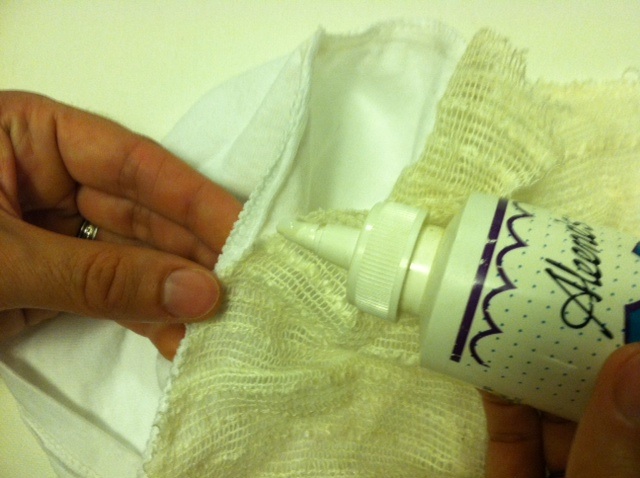
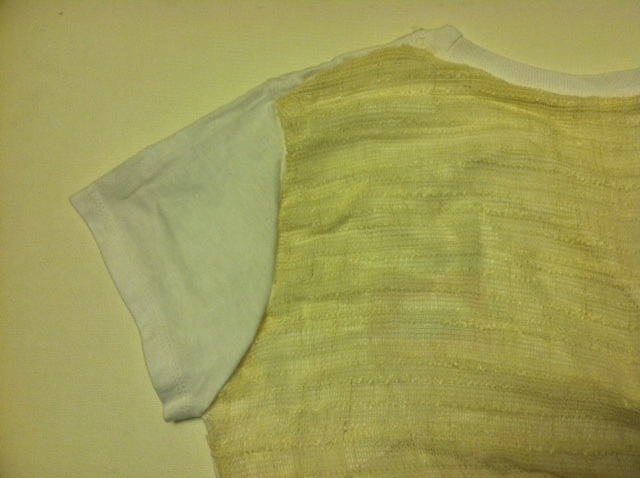
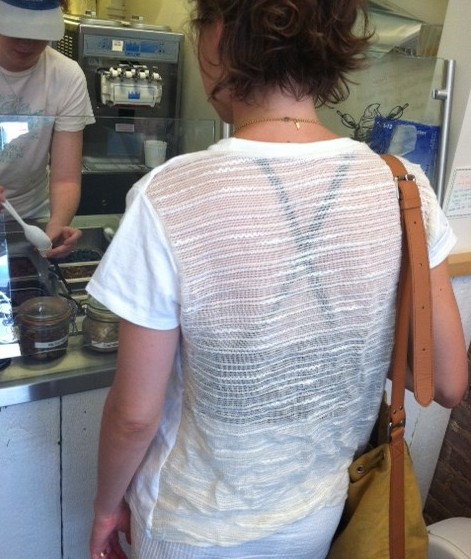




Love this! Nice job!
Thanks, Susan — I definitely want to experiment with this one in different fabrics….
Hi!
This fabric glue of which you speak… is it really as awesome as I’m hoping?! I don’t have a sewing machine, and sewing by hand is a bit of a challenge at times because I suffer from ultra-sweaty paws. I’ve been successful with your projects by hand, though they take me longer than I’d like because of having to stop when the tide comes in…
Thanks so much, I’m really excited to try this project!!!!!
Kris
Hi Kris — fabric glue can be a lifesaver if you’re averse to sewing (or it’s tricky for one reason or another :). The only drawback for me is that sometimes the glue stiffens a bit when it dries, and I think stitching allows for a smoother seam. However, there IS a fabric glue that is meant specifically for stretch fabrics (like T-shirts), but I’ve yet to try it personally. Here’s a video demonstration from the company that makes it, though, in case you’re interested! Let me know if you try it! http://www.youtube.com/watch?v=J2TXx1Y_Km0